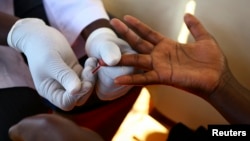Two parliamentary committees want to cut costs by closing down the Uganda AIDs Commission (UAC), set up 24 years ago to oversee and coordinate HIV prevention and control — despite activists' fears that this could damage the fight against HIV/AIDS.
Uganda was seen as a role model in tackling the HIV epidemic in the 1990s, and activists say the effectiveness of the UAC led several other countries to take it as a model for their their AIDS response and management.
Parliament's budget and health committees have recommended dissolving the UAC in order to cut costs and end the duplication of roles between the commission, a semi-autonomous agency under the Office of the President, and the Aids Control Program, which is under the Ministry of Health.
The UAC was set up at a time when the HIV/AIDS epidemic was ravaging the country, and was responsible for formulating policy, coordinating HIV programs across several ministries, mobilizing and monitoring resources, leading advocacy activities and promoting HIV/AIDS-related research.
It does not directly implement HIV/AIDS programs. Parliament's health committee recommended amending the law which established the commission to make it answerable to the Ministry of Health.
"By maintaining UAC under the President's Office and AIDS Control program under the Health Ministry, it makes government duplicate activities," the committee wrote in their report.
The UAC chairman, Prof. Vinand Nantulya, told the Thomson Reuters Foundation he disagreed with the committees, and said the UAC board had written to the president, Speaker of Parliament and health ministry, objecting to the proposal.
"We have already expressed our concerns. When this recommendation was made, we were not consulted," said Nantulya. "This is not a standard way of formulating policy," he added.
Parliament is currently in recess ahead of general elections on February 18 and no action is expected until the election results are known. Parliament's current term ends in May.
Civil society groups issued a joint statement on Monday to express concern over the recommendation, describing it as an "unfortunate development" which would reverse the way HIV is managed in Uganda.
"This is a decision that is going to have high consequences for the national HIV response," said Joshua Wamboga, executive director of the Uganda Network of AIDS Service Organizations.
Dr. Lydia Mungherera, an activist who lives with HIV, said dissolving the UAC now would be a "major strategic mistake that will lead to a reversal in the gains Uganda has started to make, negatively impacting the lives of people living with HIV/AIDS."
New HIV infections have increased in Uganda in recent years, a change attributed mainly to complacency among the public and the advent of life-prolonging drugs, and prevalence currently stands at 7.3 percent of the population.
UAC figures show that 1.5 million Ugandans are living with HIV, some 143,000 of them children, out of a population estimated at 39 million.
More that 99,000 Ugandans became newly infected with HIV in 2014, a drop from 137,000 in 2013, the figures show. At least 823,000 Ugandans, 61,000 of them children, are enrolled in antiretroviral treatment, 56 percent of all those
living with HIV.











